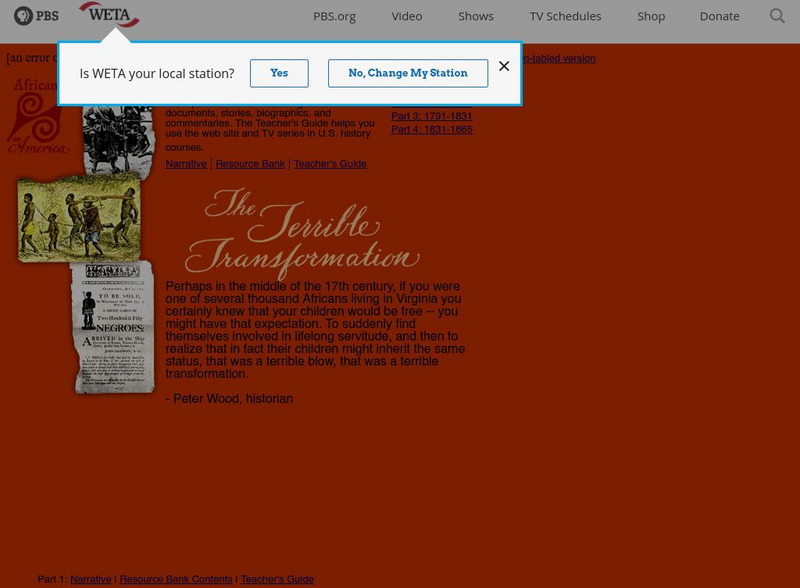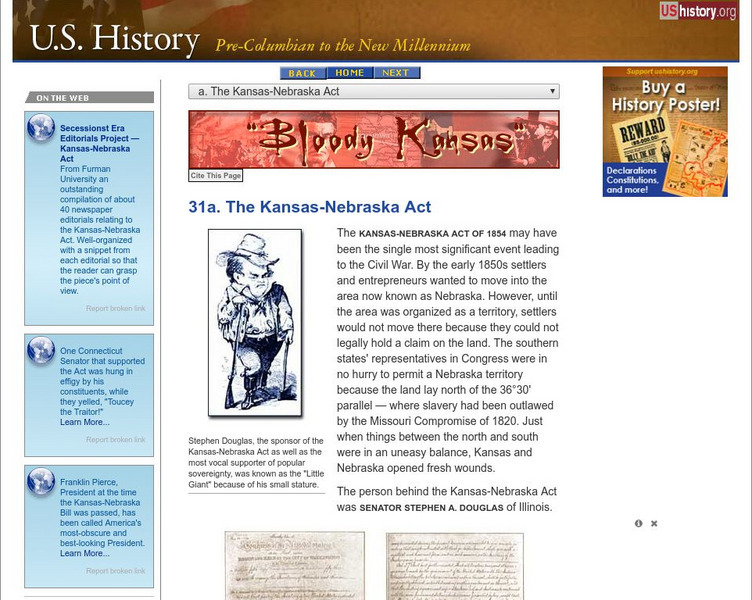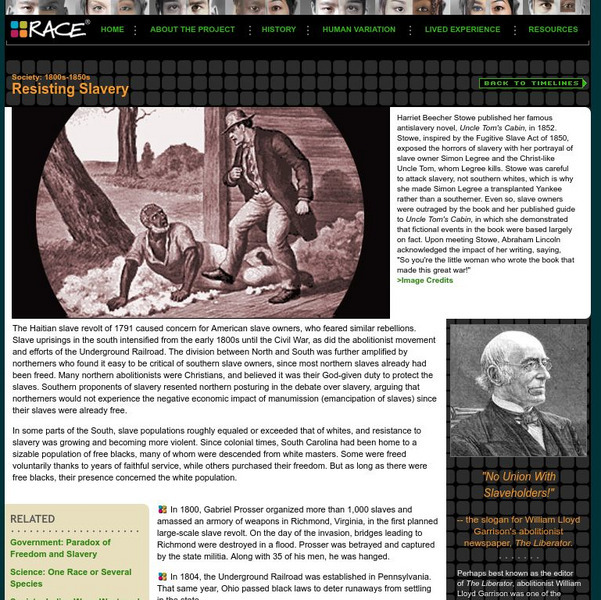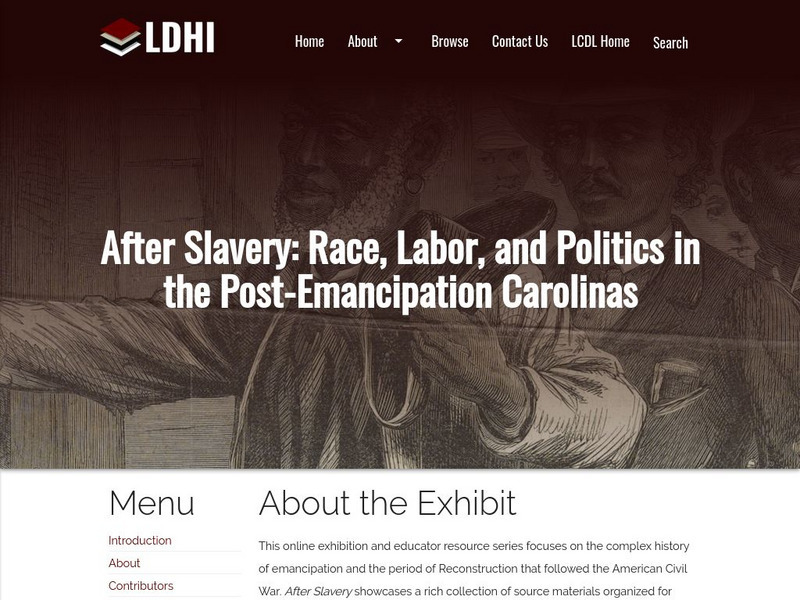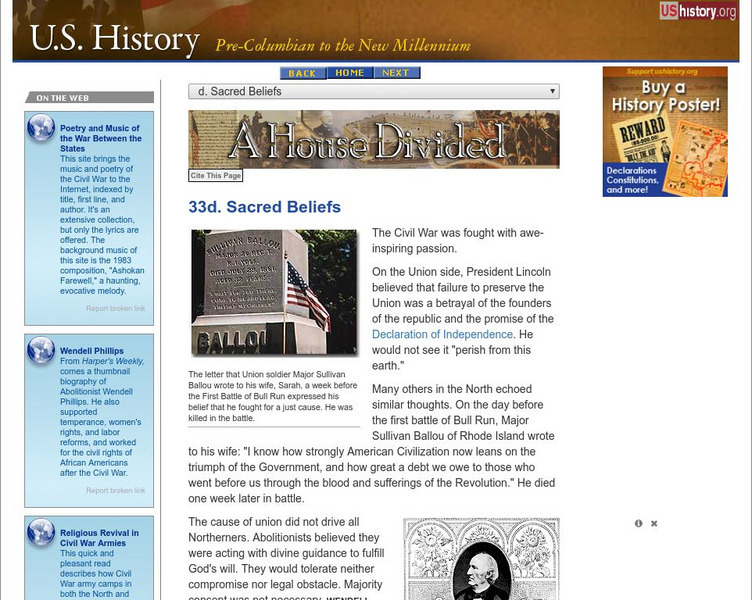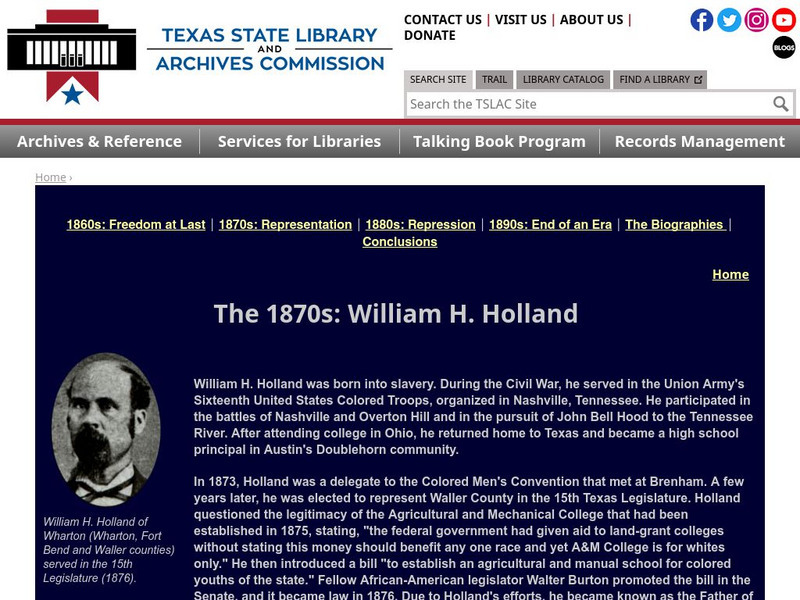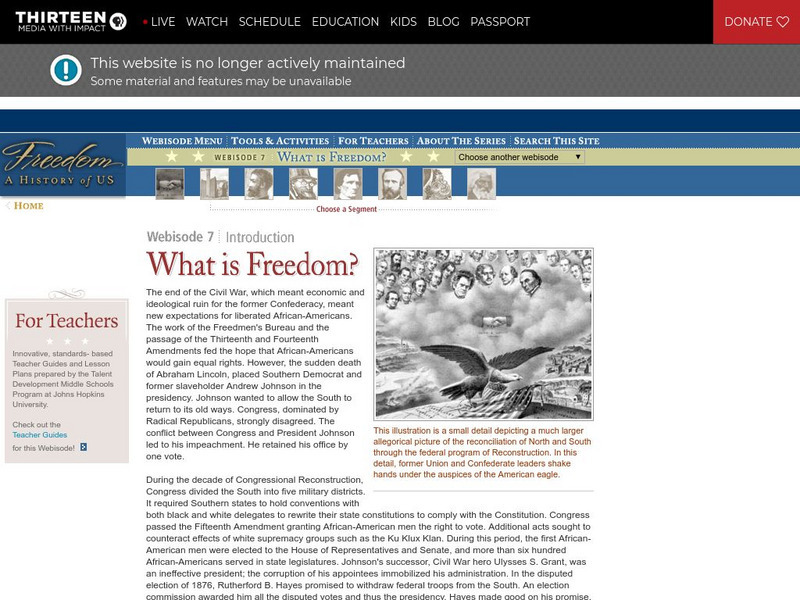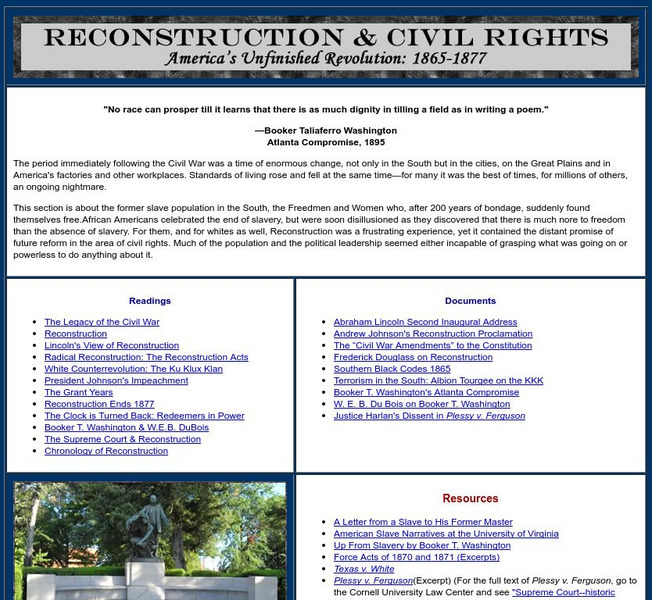Hi, what do you want to do?
Thomson Reuters
Find Law: Landmark Decisions
This site details the controversial issues regarding slavery and the effects they had on the Civil War amendments as well as on the fifth amendment. The site discusses events such as the Dred Scott case, the addition of the Civil War...
PBS
Pbs: Africans in America
PBS offers a four-part series on the plight of African Americans from slave days to the end of the Civil War. Resources such as interactive maps, a Resource Bank, and Teacher's Guide are available.
PBS
Pbs: Africans in America: Slavery and the Origins of the Civil War
An article by Columbia University historian Eric Foner that discusses how long-standing views of the role of slavery in America began to be challenged during the civil rights era of the 1960s by a new generation of historians, whose work...
Other
Afgen.com: Address to the Colored People
This page from Afgen.com contains the address delivered to the colored people at Galesburg, Illinois, 1867 by Robert G. Ingersoll. It emphasizes the rights of blacks as a result of the Civil War and Ingersoll encourages African-Americans...
Other
The Spread of u.s. Slavery, 1790 1860
Presents population maps of enslaved and free African Americans before the Civil War based on census population.
Independence Hall Association
U.s. History: The Kansas Nebraska Act
Read about the essential repeal of the Missouri Compromise, which had established which states could be slave and which would be free for thirty years, with the rancorous passage of the Kansas-Nebraska Act. See who supported it and why,...
National Women’s History Museum
National Women's History Museum: Harriet Tubman
Learn about Harriet Tubman, the first African American woman to serve in the military who escaped enslavement and helped others reach freedom During the Civil War.
Other
Understanding Race: Society: 1800 1850s: Resisting Slavery
An overview of slave revolts and abolitionist efforts during the first half of the nineteenth century, leading up until the Civil War. Read about the Underground Railroad, the colonization movement, and various anti-slavery books.
Nebraska Studies
Nebraska Studies: Kansas Nebraska Act Signed
This is a narrative detailing the signing of the Kansas-Nebraska Act in 1854 and the controversy that grew from it.
Other
After Slavery Project: Race, Labor and Politics in Post Emancipation Carolinas
This site is a collaborative work-in-progress involving a team of four scholars based in the US, Ireland and the UK. It consists of ten learning units on topics revolving around the emancipation of slaves in the American South following...
Independence Hall Association
U.s. History: Sacred Beliefs
At the beginning of the Civil War people in both the North and the South held firm beliefs about the reasons for the war. Some wanted to preserve the Union, others to end slavery. In the South the question was about states' rights and...
Khan Academy
Khan Academy: The Kansas Nebraska Act and Party Realignment
Learn about the Kansas-Nebraska Act. Passed in 1854, it reopened the debate over the expansion of slavery in the United States.
Pennsylvania Historical and Museum Comission
Explore Pa History: Pennsylvania Democrats
A good look at the views of the Democratic Party in Pennsylvania just prior to and during the Civil War. Read about Democratic president from Pennsylvania, James Buchanan, and his views about the importance of slavery in the national...
Digital History
Digital History: America's Reconstruction
An overview of Reconstruction provided by the University of Houston. Provides images and the political climate that occurred during this part of American History.
Gilder Lehrman Institute of American History
Gilder Lehrman Institute: Ap Us History Study Guide, Period Five: 1844 1877
[Free Registration/Login Required] Advanced Placement U.S. History learning module on Civil War era America and the transformation of society, 1844-1877. Comprehensive study tools include videos, essays, primary source documents, and...
Independence Hall Association
U.s. History: The Peculiar Institution
A very brief look at the "Peculiar Institution" of slavery in the South before the Civil War. Read about how slavery became so entrenced and why it drove a wedge between the North and South.
Texas State Library and Archives Commission
Texas State Library and Archives Commission: Forever Free: The 1870s: William H. Holland
Read a brief bio on William H. Holland, a man born into slavery who not only fought in the Civil War but also involved in politics and working to advance African Americans during the Reconstruction. Read about some of his work as a Texas...
Digital History
Digital History: The South's Economy
A good look at the economy of the South prior to the Civil War. Read a good explanation of how the use of slave labor impeded technological innovation and a lack of urban development. See how transportion improvements and good public...
Annenberg Foundation
Annenberg Learner: American Passages: Race and Identity in Antebellum America
This unit features authors of Antebellum America and how they portray the American identity through their literature. Click on the tabs to explore the various resources available to enhance this unit.
PBS
Pbs: Slave to Sharecropper
This collection of resources examines the life and work of freed slaves after the Civil War. Includes questions and answers on sharecropping in the American South, as well as a personal account from a former slave who became a sharecropper.
PBS
Wnet: Thirteen: Freedom: A History of the u.s. What Is Freedom? Webisode 7
Webisode 7 - What is Freedom? ..The history of the United States is presented in a series of webisodes, within each are a number of segments.Included are links to lesson plans, teacher guides, resources, activities, and tools.
PBS
Pbs Learning Media: The Reconstruction Amendments
For this interactive lesson, students will understand and explain the key provisions of the 13th, 14th and 15th Amendments to the U.S. Constitution, commonly referred to as the Reconstruction Amendments.
Henry J. Sage
Sage American History: Reconstruction & Civil Rights
Following the Civil War in the United States came an era of reconstruction. The men and women who were freed from slavery were suddenly stuck trying to sort out all of the freedoms as well as new responsibilities they were facing. The...
Other
Binghamton University: Lincoln, Labor and Liberation
The free labor ideology of the nineteenth century was grounded in the beliefs that Northern free labor was superior to Southern slave labor. It was this free labor ideology and not the republicanism of the Revolutionary War era that...






